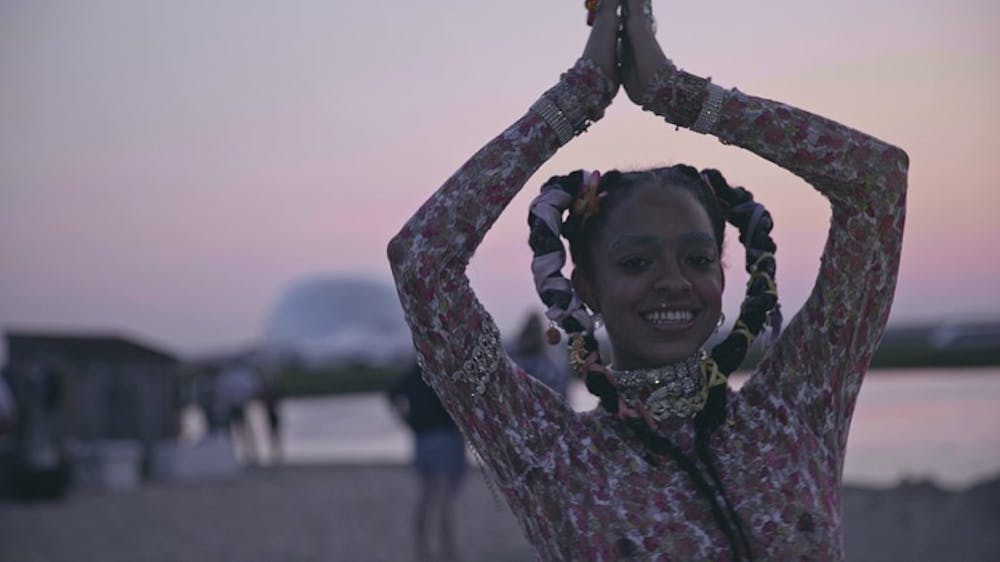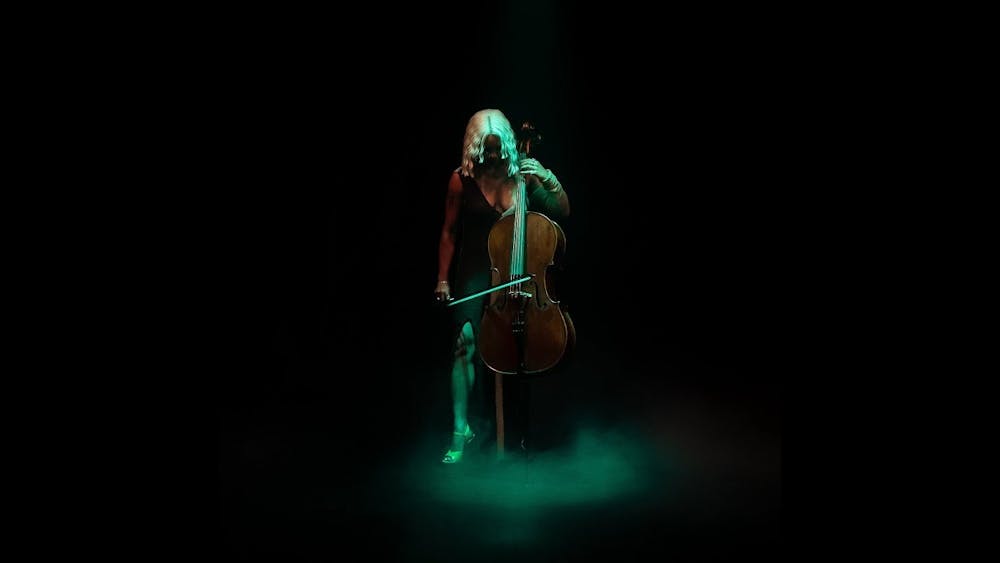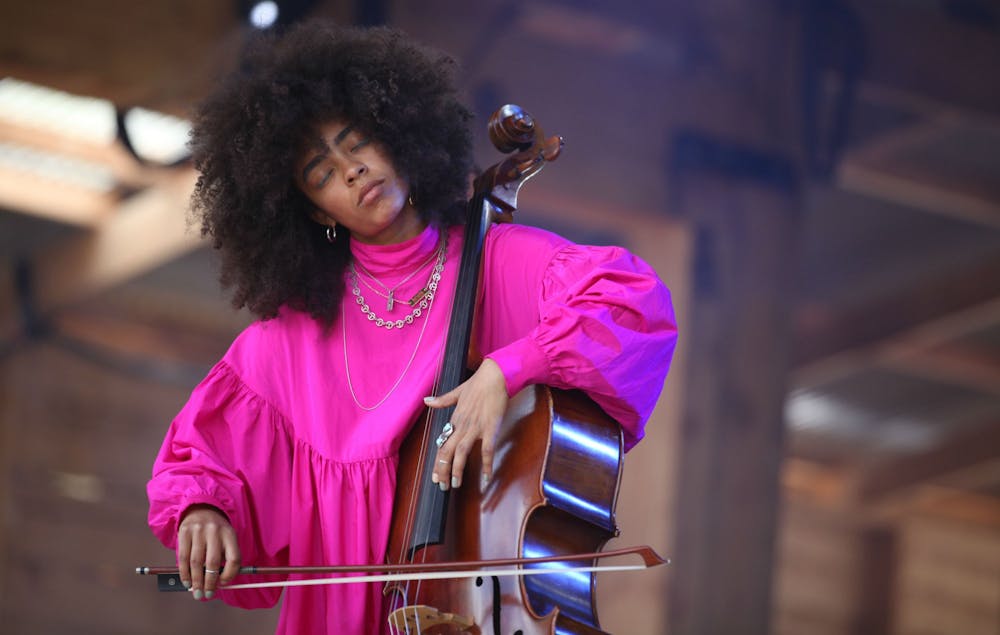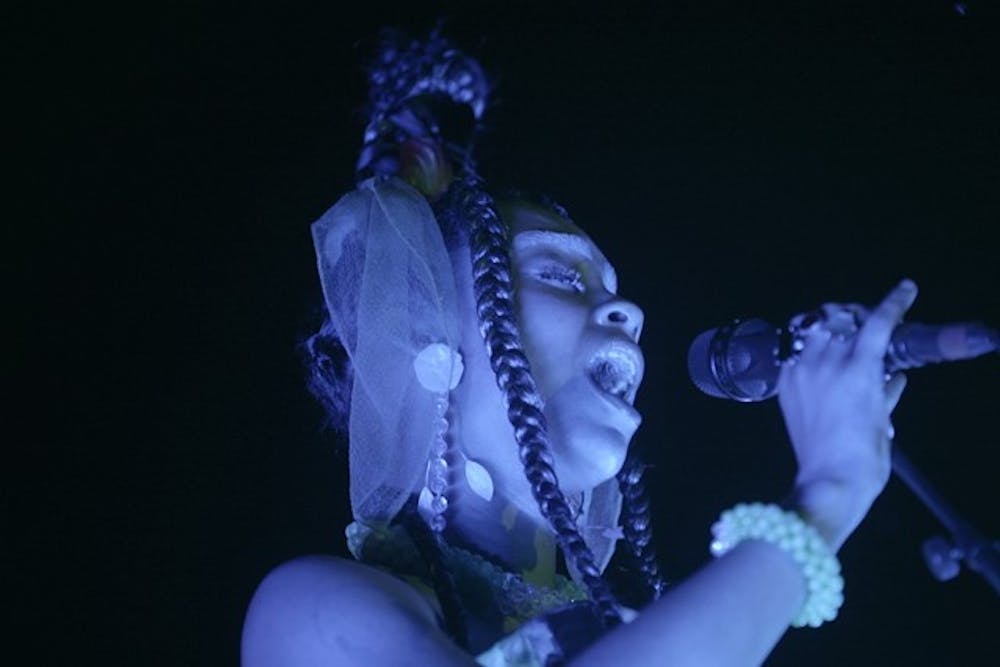In the bleak months of February, some people may find themselves in the midst of a mid-winter slump, searching for sanctuary within a harsher climate. This month’s Artist of the Month, singer and cellist Kelsey Lu, sings bewitchingly about the season, “Sudden shiver, taking a dip in a river in winter. Cold breeze caressing frozen cheeks.” Their most recent projects, Blood and Hydroharmonia, soothe the soul through the winter months, bringing promises of healing and hope.

Image from Dazed
Mother Nature’s Musical Masterpiece
Born of the landscape, comes Lu’s carefully crafted ode to mother nature and all its creatures. As a queer Black artist and self-proclaimed polymuse, Lu grew up feeling isolated within the strict ideals of their upbringing. Born and raised in North Carolina to a family of devout Jehovah’s Witnesses, Lu struggled to find their place in this community, eventually leaving home to study classical cello at the University of North Carolina School of the Arts. During those years, they found solace in the vastness of the natural world. Nature provided connection when members of their family and community fell short. In a 2020 interview with The Guardian, Lu said this about humanity's universal connection to the Earth, “The more you’re in tune with nature, the more you’re in tune with yourself, your spirit.” Their works are centered around this innate connection. Hydroharmonia was crafted at the height of the pandemic. Lu spent lockdown isolated in the Cayman Islands writing and creating the soundscape that would become this three-part musical journey.
The first installment is the highlight of the trilogy. Lasting 20 minutes, Lu takes listeners through the cycle of a sound bath, tuned to the healing frequency of the universe, 432 hertz (though there is some debate on the exact frequency). The instrumentation is overlaid with low-fi film clips of captivating skies and ocean views across the Cayman Island. The listener is submerged in both a visual and auditory therapy that soothes the senses.

Image from YouTube
Art is Collaboration
Lu thrives in collaboration. Whether it’s in nature or with their fellow artist, Lu manages to morph into a new project—becoming its missing piece. As a multidisciplinary artist, they are able to change focus, aiding a project with the sweeping sounds of their cello, or sometimes through theatrical visual arts. Over the last decade they have collaborated with many notable artists, including Florence + the Machine, Blood Orange, Sampha, Kelela, Yves Tumor, Skrillex and Solange. One stand out collaboration is "let all the poisons that lurk in the mud seep out” with multi-instrumentalist Kelly Moran. The performance was part of Stephan Colbert’s Play at Home series and debuted in June 2021. The visuals are striking as the lights come up on Lu, hanging hauntingly over their cello. A dark green poisonous gas creeps into the scene and moves through the space, as Lu’s cello playing begins to escalate. The effect is powerful at creating an eerie mood and aesthetic, which is encouraged and reinforced by Moran on the piano. The two artists expertly weave through the piece coming to a powerful conclusion of new visual and musical heights.
This month Lu collaborated with fellow pioneering Black artists at Carnegie Hall for Afrofuturism, a cultural aesthetic that utilizes technology and cultural practices to imagine the future of the African Diaspora. The festival ran through Black History Month and highlighted many Black artists including Lu, who was featured on Feb. 17 alongside Sun Ra Arkestra and spoken-word artist Moor Mother.

Image from NME
Our Shared History
The goal of Lu’s work is growth and healing. Their work constantly wrestles with personal, generational, and historical trauma. Their 2019 album, Blood, represents Lu and many Black Americans’ difficult struggle away from hopelessness towards healing. The title track speaks to this message, directly calling attention to the violent anti-Black history of America. They sing, “Black is dripping on the walls. Don't got game, but got the ball. Took the call, could lose/it all. But I can't stop trying to get through. Drop, drop, dropping to the floor. Jazz ain't/ dead, it's in us all. History has taught us hope, hope is the answer. Yes, it is”
As Black History Month draws to a close, these words stand as a staunch reminder of America’s continued violence against Black Americans. Our history continues to affect our present with recent Black Lives Matter protests and ongoing police brutality across the country. Art is hopeful creativity in the face of adversity —and Lu’s work is incredibly hopeful. Hope is a theme that Lu comes back to again and again, even in the darker more gritty songs on the album. In a recent NME interview, they had this to say about the role hope plays within their work, “I’m always looking for hope―I’m looking for a sense of hope and comfort.” This sentiment is palpable throughout their entire discography but particularly in the lyrics of “Morning Dew", “Wash off the old, put on the new, morning dew.” These words feel sympathetic and hopeful to the present seasonal and historical cycles. Wash off the old of winter and evolve into the newness of springtime —carrying a hopeful message of healing, growth, and evolution.
Featured Image: Dazed
Sources: Spotify, YouTube, The Guardian, YouTube, YouTube, AskAudio, Spotify, Spotify, Spotify, Spotify, Spotify, Spotify, Spotify, YouTube, Spotify, YouTube, Carnegie Hall, Ask Audio, Spotify, Spotify, Spotify, Black Lives Matter, Fight the Power, NME, YouTube
Contact Bernadette Harding with comments at baharding2@bsu.edu and on Instagram @bernadette.harding.




















